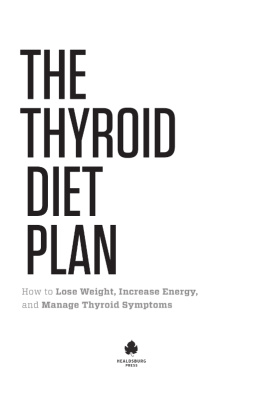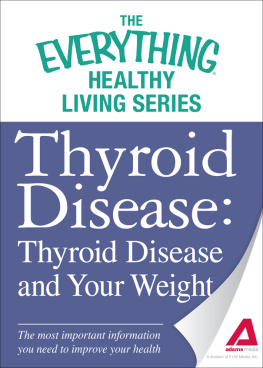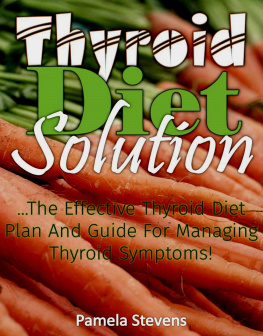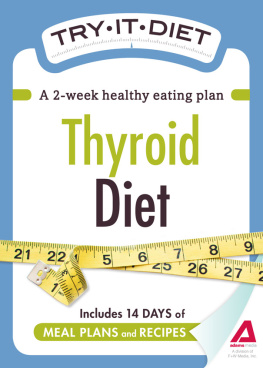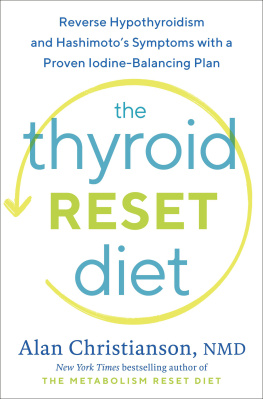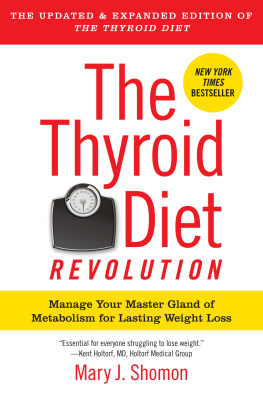THE THYROID DIET PLAN


Copyright 2013 by Healdsburg Press, Berkeley, California
No part of this publication may be reproduced, stored in a retrieval system or transmitted in any form or by any means, electronic, mechanical, photocopying, recording, scanning or otherwise, except as permitted under Sections 107 or 108 of the 1976 United States Copyright Act, without the prior written permission of the Publisher. Requests to the Publisher for permission should be addressed to the Permissions Department, Healdsburg Press, 918 Parker St, Suite A-12, Berkeley, CA 94710.
Limit of Liability/Disclaimer of Warranty: The Publisher and the author make no representations or warranties with respect to the accuracy or completeness of the contents of this work and specifically disclaim all warranties, including without limitation warranties of fitness for a particular purpose. No warranty may be created or extended by sales or promotional materials. The advice and strategies contained herein may not be suitable for every situation. This work is sold with the understanding that the publisher is not engaged in rendering medical, legal or other professional advice or services. If professional assistance is required, the services of a competent professional person should be sought. Neither the Publisher nor the author shall be liable for damages arising herefrom. The fact that an individual, organization or website is referred to in this work as a citation and/or potential source of further information does not mean that the author or the Publisher endorses the information the individual, organization or website may provide or recommendations they/it may make. Further, readers should be aware that Internet websites listed in this work may have changed or disappeared between when this work was written and when it is read.
For general information on our other products and services or to obtain technical support, please contact our Customer Care Department within the U.S. at (866) 744-2665, or outside the U.S. at (510) 253-0500.
Healdsburg Press publishes its books in a variety of electronic and print formats. Some content that appears in print may not be available in electronic books, and vice versa.
TRADEMARKS: Healdsburg Press and the Healdsburg Press logo are trademarks or registered trademarks of Arcas Publishing and/or its affiliates, in the United States and other countries, and may not be used without written permission. All other trademarks are the property of their respective owners. Healdsburg Press is not associated with any product or vendor mentioned in this book.
ISBN: Print 978-0-9895586-1-7
Contents
Introduction
I f you are one of the 59 million Americans who suffer from some form of thyroid disease, or have a family history of thyroid problems, you may be at risk for obesity, heart disease, anxiety, depression, hair loss, and sexual dysfunction. Fortunately, the good news is that a smart diet, in combination with exercise and hormonal treatment, can help you manage these symptoms. (Be sure to consult with your physician about a course of treatment appropriate for your condition.)
This book will help you understand whats going on in your body and how to recognize the common symptoms, as well as how to improve your overall well-being with sensible exercise and delicious, healthful eating. Included here are more than 100 recipes and a 30-day meal plan to get you started on the road to better health.
Once you have the information you need to start eating right, you can take charge of your dietand soon youll be on your way to feeling more energetic, less anxious, and less depressed. Its the smart, healthy thing to do!
PART ONE
Thyroid Function and Disorders


CHAPTER ONE
Do You Have a Thyroid Condition?
Symptoms of a Disorder
Signs of a thyroid condition vary from person to person and can sometimes mimic other diseases, which is one reason why thyroid disorders often remain undiagnosed. If you are experiencing symptoms that are affecting your quality of life, your physician can run some simple tests to determine whether you have a thyroid disorder. (Information about testing and what to expect can be found in .) This chapter will focus on the function of your thyroid and the symptoms associated with the two most common disorders, hypothyroidism and hyperthyroidism.
Root of the Problem: Thyroid Gland
The thyroid is a large endocrine gland found in the neck, behind the thyroid cartilage, or Adams apple. The thyroid gland has several functions, which include regulating energy use (metabolism), making proteins, and controlling the bodys reaction to other hormones.
The thyroid produces hormones that regulate the rate of metabolism and affect many other systems in your body. Hormones are among the bodys messengers, signaling to the cells to perform various functions. Sending messages via hormones is one way that the body maintains homeostasis, or balance.
The thyroid glands release of hormones is regulated by thyroid-stimulating hormone (TSH), which in turn is regulated by thyrotropin-releasing hormone (TRH), a hormone produced in the hypothalamus. Many things can go wrong and disrupt this so-called feedback loop, and these events often result in hypothyroidism or hyperthyroidism. (Hypo- is a prefix meaning less than normal, and hyper- means greater than normal, so hypothyroidism refers to a case of a weak thyroid, whereas hyperthyroidism is a condition in which the thyroid gland becomes overactive.)
Hypothyroidism
Hypothyroidism is characterized by low levels of circulating thyroid hormones and can take several forms. Primary hypothyroidism is caused by disease of the thyroid itself. The most common cause of hypothyroidism is Hashimotos disease, in which the bodys autoimmune system attacks the thyroid gland. Women are at greater risk of developing Hashimotos disease than men, particularly as they age. Primary hypothyroidism is also sometimes associated with other endocrine (hormonal) disorders, such as Addisons disease.
Secondary hypothyroidism refers to a problem with the feedback loop that regulates the release of thyroid hormones. Usually the problem is a deficiency of TSH, and it results from a disease of the pituitary gland or hypothalamus.
Iatrogenic hypothyroidism may result from removal of the thyroid gland or treatment with radioactive iodine. And if you are pregnant, you may be at risk for postpartum hypothyroidism, which is temporary.
If you answer yes to three or more of the following questions, you may be experiencing symptoms of hypothyroidism:
- Have you been feeling unusually lethargic or fatigued despite getting enough sleep?

